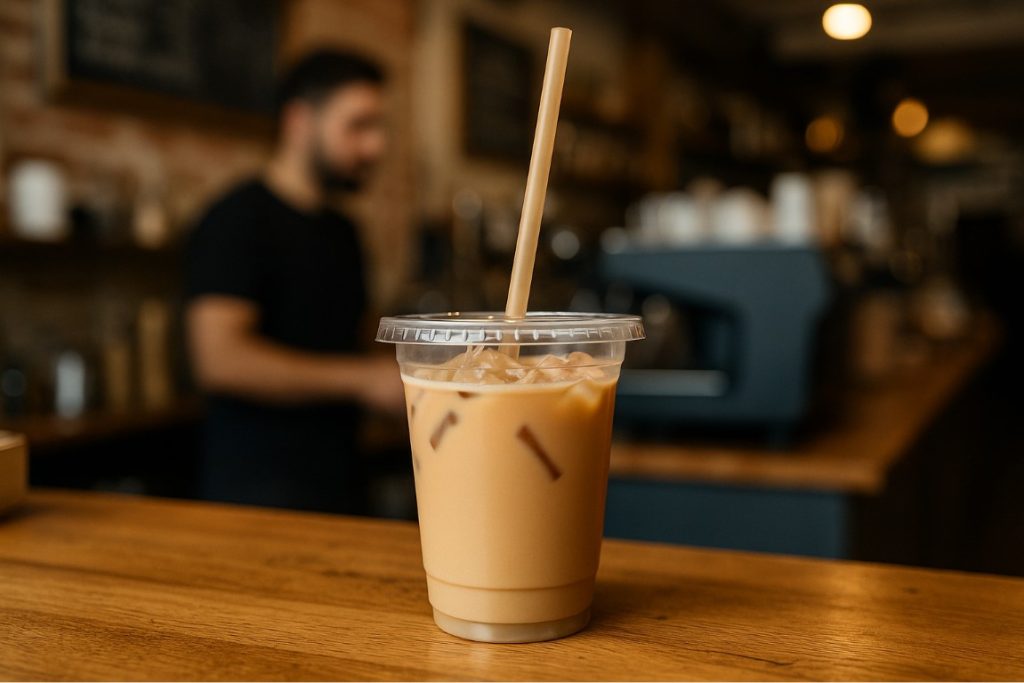“Can I get that iced latte in something eco-friendly?” a customer asked while leaning across the counter at a bustling coffee shop in Brixton.
The barista smiled, pointing to the transparent cup in hand: “Of course. These are compostable PLA cups. They look just like plastic, but they’re plant-based and compostable.”
This simple exchange reflects a broader cultural shift: today’s coffee drinkers are no longer satisfied with just great flavor—they want beverages served in packaging that aligns with their environmental values. Across Europe and beyond, cafés, roasters, and coffee chains are switching to plant-based, compostable cups as part of a greener coffee movement.
The Rise of Compostable PLA Cups in the Coffee Industry
A 2024 Deloitte consumer survey showed that 72% of coffee drinkers prefer brands that use eco-friendly packaging. For cafés, the transition is no longer optional—it’s a strategic necessity. Transparent, plant-based cups known as compostable PLA cups clear have become a popular replacement for petroleum plastics.
These cups are made from polylactic acid (PLA) derived from renewable resources such as corn starch or sugarcane. They not only look identical to conventional clear plastic but also break down under industrial composting conditions, reducing landfill waste and cutting carbon footprints.
Why Compostable Plastic Cups Matter for Coffee Culture
Scientific studies confirm the urgency. The European Environment Agency (EEA) reported that food and beverage packaging accounts for over 40% of total single-use plastic waste. PLA alternatives significantly reduce long-term pollution since they decompose within 90–180 days under composting facilities, compared to hundreds of years for traditional plastics.
Coffee shops that adopt compostable plastic cups are responding to consumer demand for transparency and responsibility. In fact, a recent case study in London found that cafés advertising eco-friendly packaging saw a 22% increase in repeat customers among millennials and Gen Z.
Case Study: Cold Brews, Clear Cups, and Consumer Trust
Cold coffee drinks are among the fastest-growing beverage categories. According to Mintel Research, cold brew consumption in the U.K. rose by over 40% between 2020 and 2024. But with this surge comes rising demand for transparent cups that showcase the product’s quality.
Here, PLA compostable clear cups for cold are a natural fit. They are durable, crystal clear, and suitable for iced lattes, frappés, smoothies, and cold brew. Bioleader, one of the leading suppliers, has worked with cafés and event organizers worldwide to ensure cold beverages maintain premium presentation while avoiding the pitfalls of single-use plastic.
Beyond the Cup: Brand Image and Environmental Credibility
Packaging is more than functional—it’s an ambassador of your café’s values. A McKinsey 2023 report revealed that brands adopting sustainable packaging see a 5–10% higher Net Promoter Score (NPS).
By serving iced coffees in environmentally friendly plastic cups disposable, cafés reinforce their eco-conscious identity. Social media trends further amplify this: a Statista survey found that 43% of young consumers post eco-friendly packaging on Instagram. This digital “word of mouth” can turn compostable cups into a marketing asset.
Sizing Matters: Choosing the Right PLA Cold Drink Cup
One common concern for coffee shops is portion sizing. The National Coffee Association (NCA) notes that serving sizes for iced beverages vary significantly, from small 12oz iced americanos to large 16oz smoothies.
Practical solutions are now available with biodegradable compostable cold drink cups 12–16oz, which cover the most common café beverage sizes. This flexibility ensures businesses can match consumer expectations while staying sustainable.
Bioleader’s Contribution to Coffee Sustainability
Bioleader has emerged as a global manufacturer supporting the café and hospitality sector with compostable packaging. From PLA cold cups to bagasse bowls and kraft paper containers, the company has built a reputation for compliance with EN13432 and ASTM D6400 standards, as well as BPI and TÜV certifications.
Recent industry expos in Berlin and Dubai highlighted Bioleader’s ability to deliver OEM/ODM customized solutions, including logo printing and bulk supply. By aligning with international plastic reduction laws, Bioleader ensures that cafés and coffee chains are not only meeting today’s sustainability expectations but also preparing for future regulations.
FAQs: Compostable PLA Cups and Coffee Shops
Q1: Are compostable PLA cups suitable for hot drinks?
No. PLA is designed for cold beverages. For hot drinks, paper cups with PLA or aqueous linings are recommended.
Q2: How long do PLA cups take to decompose?
Under industrial composting, PLA cups usually break down in 90–120 days. However, they require specific composting conditions and won’t degrade in home compost piles as quickly.
Q3: Do compostable cups cost more than plastic?
Yes, slightly. But bulk purchasing reduces the cost difference, and cafés often recoup the investment through improved brand image and customer loyalty.
Q4: Can compostable PLA cups be branded with logos?
Yes. Manufacturers like Bioleader provide custom printing options, allowing cafés to highlight their eco-friendly message directly on the cup.
Q5: What sizes of compostable cups are most common for cafés?
The 12oz and 16oz sizes are the most popular for iced coffees, teas, and smoothies, as they cover the majority of standard drink portions.
Conclusion: A Sustainable Brew for the Future
From Brixton’s vibrant coffee scene to global franchises, the shift toward compostable PLA cups is more than a passing trend—it’s a reflection of a new era in coffee culture. Customers expect their lattes and cold brews to be served in cups that echo their values of health and sustainability.
Whether cafés adopt compostable PLA cups clear, upgrade to compostable plastic cups, showcase iced beverages in PLA clear cold cups, align their branding with environmentally friendly disposable PLA cups, or offer flexible 12–16oz biodegradable cold drink cups, the outcome is the same: stronger customer trust, compliance with global regulations, and a greener planet.
For coffee lovers, the cup in hand now carries more than a drink—it carries a message of responsibility. For coffee shops, every compostable cup is not just a container, but a commitment to brewing a sustainable future.

